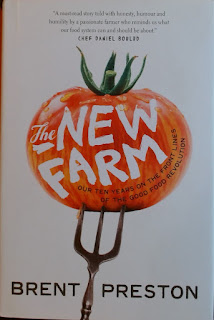This book review was written by Eugene Kernes
“Our farm is proof that small-scale, sustainable farming is a viable alternative. It’s a place of community, where chefs, activists and foodies gather to plot the overthrow of all things evil: industrial agriculture, the rate race, high-fructose corn syrup. Our farm is the centre of gravity around which we have build a happy, meaningful and productive life for ourselves. And most importantly, our farm is testament to the power of the good food movement to radically change our food system from the ground up.” – Brent Preston, Dead Reader, Page 15
“We decided at the very outset that the farm would have to support both of us. We didn’t know that the average Canadian farm loses money, that the large majority of farms are kept afloat only by income earned off-farm by one or both spouses. It didn’t seem like a lofty goal at the time, but aspiring to create a farm that was profitable enough to support our family was aiming very high. So, with ignorance again on our side, we set out with the clear idea that our farm would be a business, and a profitable one at that.” – Brent Preston, Baby Steps, Page 55
“We spent a long time going through our application and discussing our growing plans, and it slowly dawned on me that for years I had been thinking about organic in the wrong way. I had always assumed that the primary objective of organic farming was to protect consumers from exposure to chemicals. We bought organic vegetables when we lived in the city so our kids wouldn’t be eating pesticides. That’s a big part of organic, but it’s far from the whole story. Talking to Tom that day, I realized that the goal of organic regulations is much broader: to create a sustainable system of agriculture that is separate from and independent of the chemical-industrial farming that dominates the landscape.” – Brent Preston, The Groundhog Wars, Page 105
Overview:
The New Farm is proof of concept that small-scale, organic, and sustainable farming is a viable method for food production. An organic alternative to what has become conventional to agricultural industry. The organic alternative does not use a complex mix of chemical pesticides and fertilizer. Spraying chemicals is the modus operandi for conventional farmers. The pesticides make food toxic, causing people to have health problems. As organic farmers do not use chemicals, their food is of a higher quality with superior flavor. Small farms do use a powerful natural fertilizer that comes from livestock. Livestock also provide high-value products and turns waste into food.
A farm is a business, that needs money to function no matter their features. Brent and Gillian wanted to make the farm profitable to support the whole family. But in Canada, the agricultural industry generally loses money. The New Farm, kept losing money in the early years, but they kept planting due to pride, appreciation of the community, and wanting to apply lessons learned from past years.
Many conventional farmers tend to subsidize their farm with
alternative income sources, which allows them to keep prices low but also hard
to make farming sustainably profitable.
While The New Farm, became profitable without alternative income
sources. To make the farm sustainably
profitable, Brent and Gillian broke from some small farm practices by
specializing in growing profitable food rather than diverse food, and to sell
to restaurants rather than just directly to consumers.
Are There Notes From A Farmer?
Brent and Gillian joined the farming community without knowledge or experience. This meant that they came into agriculture without preconceived biases, nor with foundational knowledge. Gillian did have early experiences with farming, and relatives who were farmers. What they did do was join various farming related associations, from which they were able to learn and obtain clients from.
Farming is always hard work, no matter how knowledgeable or experienced the farmers are. Nature always has surprises, and complexity that is hard to manage. Some tips and tricks that The New Farm found was that hoop houses greatly improved the growth rate of the plants. Plants tend to only grow when the soil is warm. The New Farm also cycled land use. Alternating between regions that grew food and then were fallow, while other regions did the opposite. Crop cover added nutrients into the soil, which increased the productivity of the soil.
Gillian and Brent wanted different things. Gillian wanted to expand to become profitable, while Brent did not think it was possible to work harder. They were both right. Farming and financial difficulties strained their bodies, emotions, and their marriage.
Workers matter for a human powered farm. The New Farm initially used interns for help. Unpaid interns, who needed to be taught, and worked with them. That limited the time that could be spend making sales. They later hired Mexican workers, who were very helpful due to their skills. They treated them appropriately.
Many food products need to be sold quickly to be edible, but often becomes waste. The need for fast sales allows others to squeeze the farmer financially.
Most people do not really care for how organic farming
works, and just want to make sure it is organic. There are vendors who claim organic but are
actually conventional. Many expect
farmers to be uneducated, while Brent and Gillian were educated and used
technology to improve their agriculture organization.
Caveats?
This is a wonderful guide to the
difficult life of a farmer. Providing
valuable lessons. But not all values
were appropriate. Even though they
obtained information when needed, there was praise for starting farming without
information. Brent recognized that
Brent’s attitude sometimes made their situation difficult.
